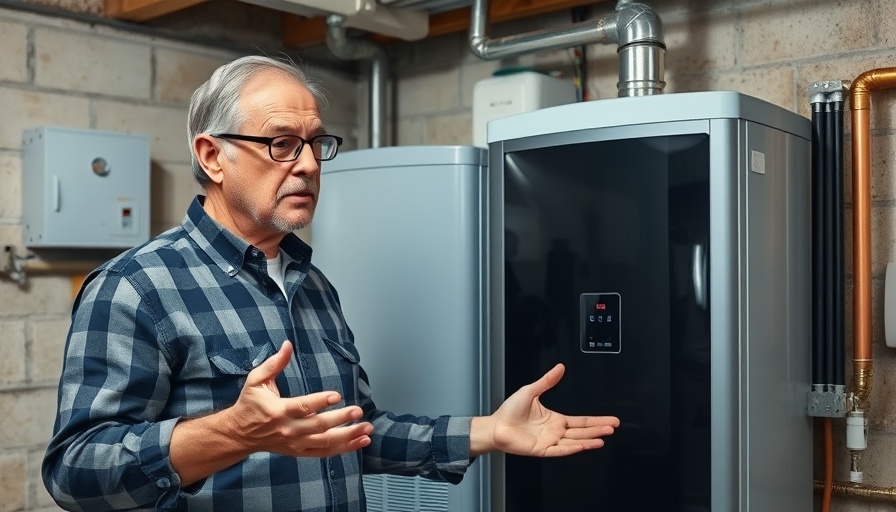
Why Tankless Hot Water Heaters Might Not Be Worth the Hype
If you're in the market for a new water heater, the trend towards tankless hot water systems might be enticing. These modern devices promise a steady supply of hot water on demand, boasting energy efficiency and flexibility. However, as more homeowners and contractors weigh the pros and cons, a controversial opinion has emerged: tankless hot water tanks may not be as beneficial as they seem. This article delves into the challenges associated with these systems, exploring whether they truly live up to their marketing claims.
In 'Controversial Opinion: Tankless Hot Water Tanks Suck!', the discussion dives into the effectiveness of tankless water heaters, exploring critical insights that sparked deeper analysis on our end.
The Problem with Endless Hot Water
One of the key selling points of tankless water heaters is the promise of endless hot water. Unlike traditional tank systems that store a finite amount of hot water, tankless heaters heat water as it flows through the unit. While this sounds ideal, users often report that during peak usage times—especially in larger households—these units struggle to deliver adequate hot water to multiple sources simultaneously. Imagine being in the shower only to be met with cold water midway through your rinse because someone else turned on the dishwasher. This inconvenient truth raises questions about the practicality of tankless systems.
Installation Costs That Could Leave Homeowners Reeling
The initial appeal of tankless systems extends beyond performance; they are often marketed as long-term savings solutions. However, many homeowners overlook that the installation process can be considerably more expensive than traditional options. On average, the cost of a tankless hot water heater and the necessary modifications can range from $3,000 to $5,000, a significant investment for any renovation budget. For homeowners considering a kitchen remodel or a bathroom upgrade, these additional expenses could derail their financial plans.
Maintenance and Repair: An Ongoing Expense?
Much like any other home technology, tankless water heaters require regular maintenance to operate efficiently. Scale buildup, often due to hard water, can necessitate de-scaling every six months to a year. This process can cost homeowners anywhere from $100 to $300 per service call. Furthermore, if the system fails, repairs or replacements are rarely inexpensive. For contractors and remodelers, educating clients on these costs is crucial in ensuring they make informed decisions about their home improvements.
Energy Efficiency: A Double-Edged Sword
One of the main benefits touted by sellers of tankless systems is their energy efficiency. In theory, they save energy by only heating water when needed. However, critics argue that the benefits are overstated. When properly sized and installed, tankless heaters can offer energy savings, but many homeowners find themselves misled by marketing claims. For those living in colder regions, say Ohio, these units might require more energy than anticipated to maintain temperatures, ultimately negating potential energy savings.
Key Considerations Before You Buy
For homeowners seriously contemplating whether to invest in a tankless water heater, it’s essential to weigh these aspects carefully. Evaluating household needs, existing plumbing systems, and your geographical climate can provide clarity. Consider consulting with a trusted contractor or plumbing expert to conduct a cost-benefit analysis tailored to your specific situation.
The Future of Water Heaters: Trends to Watch
As technology evolves, innovations in water heater designs mean that alternatives to traditional systems are sure to emerge. Homeowners should keep an eye on new technologies such as hybrid models that integrate the benefits of both tankless and tank systems. Staying informed through reliable sources can assist buyers in making choices that fit their lifestyle and budgets without succumbing to marketing hype.
Final Thoughts: Is Tankless Worth It?
In a world increasingly focused on smart home technology and renovation trends, tankless hot water heaters stand at a crossroads of innovation and practicality. While they offer distinct advantages, they also present unique challenges that deserve careful consideration. So, before jumping into a tankless system for your next home improvement project, think critically about your home's needs. Ensuring you're armed with the necessary information can help you navigate kitchen and bathroom remodels with confidence.
If you're looking to explore your options further, consider REACHING OUT to local contractors for expert advice!
 Add Row
Add Row  Add
Add 




Write A Comment